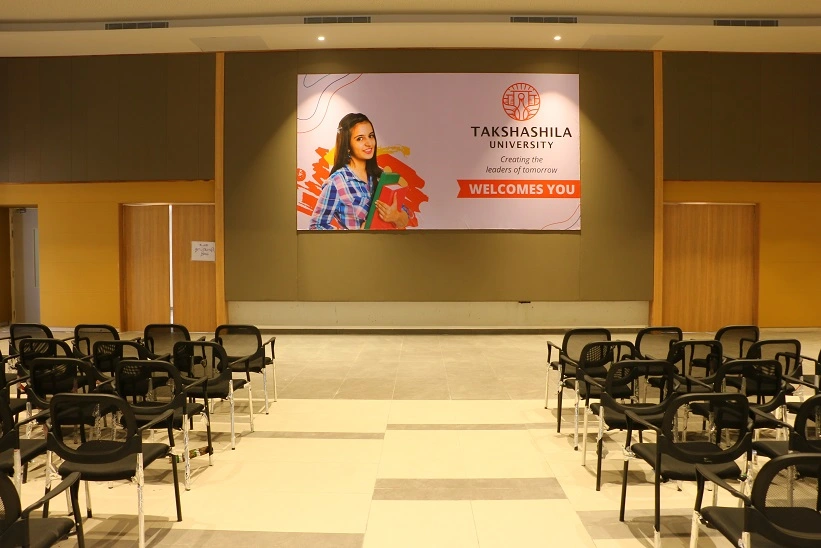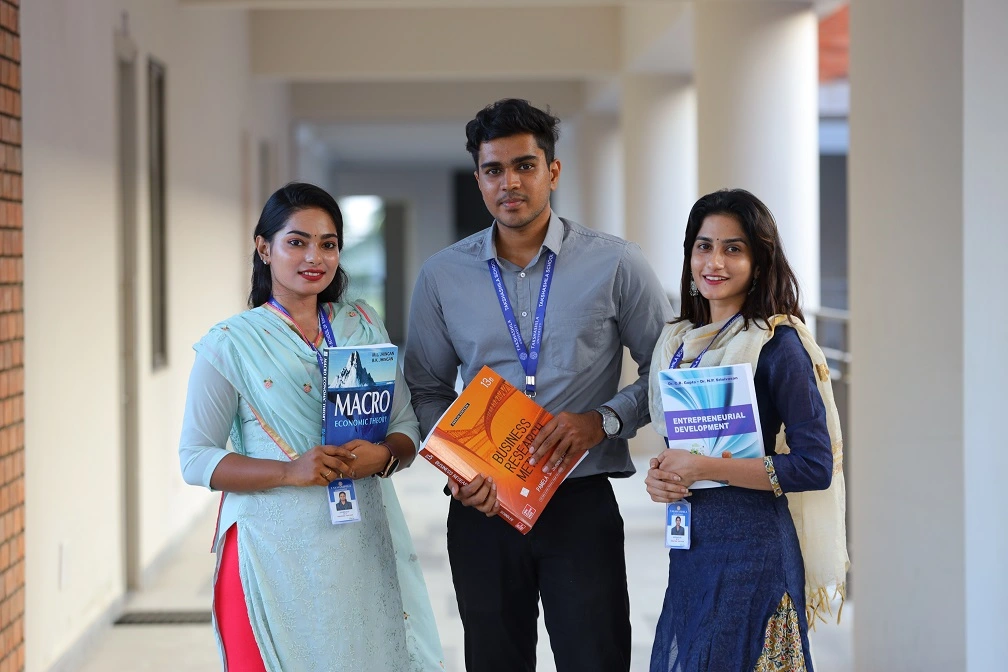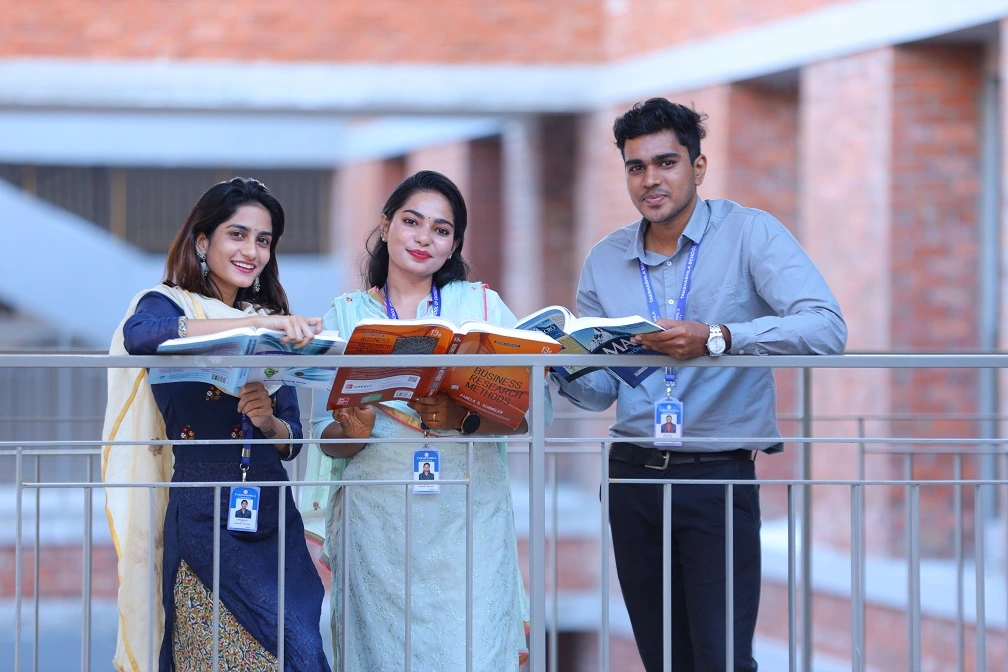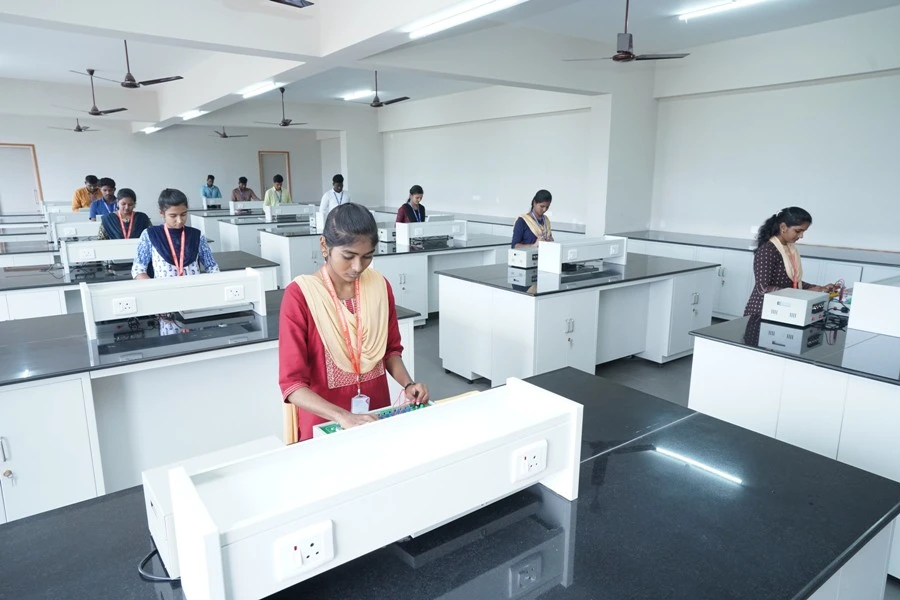B.Sc. Optometry Technology
- Hands-on Training
- Faculty with International Experience
- Advanced Curriculum
- Upto 100% Scholarship based on merit

About the Course
The B.Sc. in Optometry Technology at Takshashila University is a 3-year undergraduate programme designed to prepare students for a career in optometry. This programme combines theoretical knowledge with practical training to equip students with the skills necessary to diagnose and manage a wide range of eye conditions, provide vision care, and perform diagnostic tests. As an optometrist, you will play a crucial role in patient care, providing solutions to various vision problems, conducting eye exams, and recommending corrective lenses. This course also covers areas like ocular health, refractive errors, and modern optometric technology, preparing you to work in a variety of healthcare settings, including clinics, hospitals, and optical practices.
Course Curriculum

Year 1
The first year focuses on building a foundational understanding of the human eye, visual systems, and basic medical sciences. You will study the anatomy and physiology of the eye, as well as introductory optometry techniques.
Key Subjects: Anatomy and Physiology of the Eye, Fundamentals of Optometry, Visual Optics, Ocular Pharmacology, General Anatomy and Physiology, Introduction to Optometric Instruments.
Year 2
In the second year, you will delve deeper into optometry techniques, including refractive errors, vision screening, and diagnostic testing methods. Practical training will allow you to learn how to use advanced equipment for eye testing and treatment.
Key Subjects: Refractive Errors, Binocular Vision, Visual Perception, Optometric Instruments and Equipment, Clinical Optometry, Contact Lenses and Fitting Techniques.
Year 3
The third year focuses on advanced topics in optometry, including treatment options, ocular diseases, and post-operative care. You will also gain hands-on experience through internships and clinical rotations, working directly with patients in real-world optometric settings.
Key Subjects: Ocular Diseases and Disorders, Low Vision Aids, Optometric Therapy, Contact Lens Management, Advanced Clinical Optometry, Internship/Project Work.
Programme Outcomes (POEs)
Upon completing the B.Sc. in Optometry Technology, you will have developed the following competencies:
Comprehensive Eye Examination
You will be proficient in conducting comprehensive eye exams, diagnosing vision problems, and prescribing corrective lenses and treatments.
Refractive Error Management
You will gain expertise in identifying and correcting refractive errors through glasses, contact lenses, and other vision aids.
Ocular Health Management
You will develop the skills to monitor and manage various ocular health conditions, providing treatment or referring patients to specialists when necessary.
Clinical Skills in Optometry
You will gain hands-on clinical experience in performing vision tests, using optometric equipment, and assessing visual performance.
Patient Communication and Care
You will learn how to effectively communicate with patients, understand their needs, and provide the highest level of care.
Research and Development in Optometry
You will be prepared to engage in research related to vision health, ocular diseases, and the development of new treatment methods and technologies.
Programme Outcomes (POs)
The B.Sc. in Optometry Technology will help you achieve the following broader learning outcomes:
PO1: Expertise in Vision Testing and Diagnosis
You will gain proficiency in performing various tests to assess vision, refractive errors, and ocular health.
PO2: Knowledge of Ocular Diseases
You will learn to diagnose and manage a range of eye conditions, such as glaucoma, cataracts, and retinal disorders.
PO3: Proficiency in Using Optometric Equipment
You will become proficient in using the latest diagnostic tools and optometric instruments to conduct eye exams and provide treatments.
PO4: Patient-Centred Care
You will develop strong communication skills and the ability to offer tailored solutions to patients based on their individual vision needs.
PO5: Critical Thinking and Problem-Solving
You will be trained to analyse test results, identify problems, and recommend appropriate corrective measures.
PO6: Ethical Practice in Optometry
You will learn to maintain high ethical standards in patient care, ensuring that patient safety and privacy are always prioritised.
Programme Specific Outcomes (PSOs)
Through this programme, you will develop the following specific competencies:
PSO1: Expertise in Refractive Error Management
You will develop advanced skills in the management of refractive errors, using corrective lenses and other vision aids.
PSO2: Knowledge of Contact Lens Fitting
You will gain expertise in fitting contact lenses, including specialised types such as toric and multifocal lenses.
PSO3: Specialisation in Ocular Diseases
You will be able to identify and manage common ocular diseases, referring patients to specialists when necessary for further treatment.
PSO4: Advanced Optometric Instruments Handling
You will become proficient in using advanced optometric tools, such as automated refractors, visual field analyzers, and fundus cameras.
PSO5: Low Vision Aids
You will gain the ability to provide low vision aids for patients with visual impairments, improving their quality of life.
PSO6: Clinical and Research Skills in Optometry
You will be trained to conduct clinical research in optometry, exploring new techniques, technologies, and treatments.
Career Scope
Graduates of the B.Sc. in Optometry Technology programme will be well-equipped to pursue careers in optometry clinics, hospitals, research institutions, and educational settings. Career opportunities include:
Optometrist
- Role: Diagnose vision problems, prescribe corrective lenses, and provide ocular health management to patients.
- Salary: ₹4,00,000 to ₹8,00,000 per annum.
Optometric Technician
- Role: Assist optometrists in performing eye exams, managing equipment, and providing patient care.
- Salary: ₹3,50,000 to ₹6,00,000 per annum.
Contact Lens Specialist
- Role: Specialise in fitting, managing, and caring for contact lenses, including advanced and customised options.
- Salary: ₹4,00,000 to ₹7,00,000 per annum.
Low Vision Specialist
- Role: Provide vision rehabilitation services and low vision aids to individuals with visual impairments.
- Salary: ₹4,50,000 to ₹8,50,000 per annum.
Researcher in Optometry
- Role: Conduct research in optometry, contributing to advancements in treatment and diagnostic techniques.
- Salary: ₹5,00,000 to ₹12,00,000 per annum.
Optometry Educator
- Role: Teach and train future optometrists in academic or clinical settings.
- Salary: ₹6,00,000 to ₹15,00,000 per annum.
Why TAKSHASHILA?

Comprehensive Optometry Curriculum
The B.Sc. in Optometry Technology offers a balanced combination of theoretical knowledge and practical training, ensuring you develop the skills needed for a successful career.
State-of-the-Art Facilities
Our modern optometry labs and equipment provide you with hands-on experience in using the latest technologies in eye care.
Industry Collaborations
Takshashila University has established strong partnerships with leading eye care institutions, providing you with opportunities for clinical exposure and internships.
Experienced Faculty
Learn from experts in the field of optometry who will mentor and guide you through your academic journey.

- Applicants must have completed their 10+2 or equivalent with a minimum of 50% marks in Physics, Chemistry, and Biology.
- Entrance exams or personal interviews may be required as part of the selection process.

For All Programmes except MBA, MCA, M.Tech, and Integrated Programmes offered by Sunstone, FacePrep, Kalvium and NxtWave
|
S.No |
% of Marks |
Scholarship Amount in Tuition Fees per year |
|
1 |
60% – 75% |
10% |
|
2 |
Above 75 % – 90 % |
25 % |
|
3 |
Above 90 % |
50 % |
Calculation of percentage of Marks (+2 of HSC / 2nd Year of APBIM or +2 of CBSE or Equivalent)
- Engineering – Average marks in Mathematics, Physics, Chemistry/Computer Science
- Lateral Entry – Average marks in Diploma Programme.
- Agriculture – Average marks in Physics, Chemistry, Biology / Botany &Zoology
- AHS / BPT / Pharmacy – Average marks in Physics, Chemistry, Biology / Botany &Zoology/Bio Tech
- UG – Arts & Science / Hotel Management – Overall +2 marks – (+2 of HSC / 2nd Year of APBIM or +2 of CBSE or Equivalent)
- PG – Overall % in UG
- Diploma – Average mark in 10th /Equivalent
MBA, MCA, M. Tech, and Integrated Programmes offered by Sunstone, FacePrep, Kalvium and NxtWave – No Academic Scholarship applicable.
Student Experience at Takshashila University
At Takshashila University, the B.Sc. in Optometry Technology provides an immersive and hands-on learning experience, with access to advanced facilities, clinical placements, and expert faculty.
What you can look forward to

Practical Learning
Gain hands-on experience in optometry labs, using state-of-the-art equipment to conduct eye exams and manage ocular health.

Clinical Exposure
Participate in clinical internships at leading hospitals and eye care centres, gaining real-world experience in optometric practices.

Collaborative Environment
Work alongside peers, faculty, and healthcare professionals, developing strong teamwork and communication skills.

Research Opportunities
Engage in research projects to explore new techniques and innovations in optometry and ocular health.
Spread over 150 acres
At Takshashila University, you will have ample opportunities to hone your skills in real-world healthcare settings, utilising state-of-the-art medical facilities and simulation labs on our 150-acre campus.
Start your journey towards a career in eye care today!
Frequently Asked Questions (FAQs)
What is the duration of the B.Sc. in Optometry Technology?
The course lasts for 3 years, divided into six semesters.
Do I need prior experience in optometry to apply?
No, prior experience is not required. The programme is designed to teach you everything you need to know.
What career support is available after graduation?
Takshashila University provides job placements, internships, and career counselling to help you start your career in optometry.
Is the B.Sc. in Optometry Technology internationally recognised?
Yes, the programme is designed to meet global healthcare standards, preparing you for international career opportunities.









